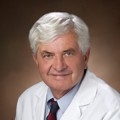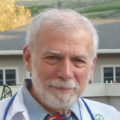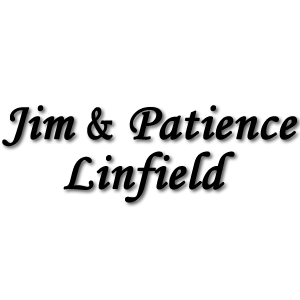2015
The Tug of War for Better Health Care
The sixth annual GoldLab Symposium focuses on the scientific and the social components of health care. In addition to the usual interesting science, humor, clinical information, medical research, and quality-of-life issues, we once again come together to think, learn, and laugh in hopes that we can turn our discussions into actions for improving health care and healthy living for all.
View Program
-
Opening Welcome
-
One to Five, Six to Ten
Transitions always are frightening, and this is a transitional year. We have done five symposia so far, and I have looked backward at what we’ve done with pleasure—almost 80 presentations about so many things that matter. I learned a lot, which is as good as it gets for me, and I got to laugh, deeply.
Now we are seeking...
-
-
Cancers and Health
-
Exploring the Evolutionary Forces Driving Tumor Development
Cancer genome sequencing has identified a level of complexity unimaginable only a few years ago. We now know that cancer often develops through a step-wise but non-linear process of clonal evolution, generating a bewidlering array of inter- and intra-tumor heterogenetiy, with only a limited number of driver mutations shared among tumors of even the same histological subtype. We also know...
-
Malignant Melanoma: The Tumor That Used to Give Cancer a Bad Name
Malignant melanoma is more than just a skin cancer. It is primarily the result of damage to the melanocytes from intense sun exposure in childhood and adolescence. These transformed melanocytes have the capacity to invade the blood and lymphatic system and spread widely, if not caught early. Unlike many other cancers, once melanoma had spread beyond the skin, standard treatment...
-
How 140 Characters Are Changing Health Care
Digital tools are auspiciously changing health care forever. It's a novel time when it comes to seeking advice about your health. While widespread social media and evolving online networks change access to information for patients and their families, they also dramatically shift physician and provider responsibilities. Improved communication is the future of smarter health care. With the change emerging technologies...
-
Transposable Elements Modulate Human RNA Abundance
Transposable elements (TEs) have significantly influenced the evolution of transcriptional regulatory networks in the human genome. Post-transcriptional regulation of human genes by TE-derived sequences has been observed in specific contexts, but has yet to be systematically and comprehensively investigated. Here, we study a collection of 75 CLIP-Seq experiments mapping the RNA binding sites for a diverse set of 51 human...
-
-
Musical Comedy
-
Damaged Care: The Musical Comedy About Health Care in America
Damaged Care: The Musical Comedy About Health Care in America, written and performed by Greg LaGana, M.D., and Barry Levy, M.D., focuses on health care issues of concern to everyone, ranging from the erosion of the doctor-patient relationship to "superbugs." During the past 19 years, they have performed Damaged Care almost 140 times in 28 states and Canada, for organizations...
-
Damaged Care: The Musical Comedy About Health Care in America
Damaged Care: The Musical Comedy About Health Care in America, written and performed by Greg LaGana, M.D., and Barry Levy, M.D., focuses on health care issues of concern to everyone, ranging from the erosion of the doctor-patient relationship to "superbugs." During the past 19 years, they have performed Damaged Care almost 140 times in 28 states and Canada, for organizations...
-
-
Big Data, Big Problems
-
A Journey to Transform Care for Children with Rare Lung Disease
Opportunities exist today to create new strategies to transform care and find cures. As a pediatric pulmonary specialist, most of my patients have rare disease. Many patients and their families often struggle to find better understanding, care, and treatments for their children. Through the advocacy of patients, physicians, and scientists a collaborative journey to create a roadmap of hope began...
-
Health: The Heart of Health Care Reform
Since March 2010, the nation has worked hard to implement the Affordable Care Act, the largest expansion of health care coverage and access since the creation of the Medicare and Medicaid programs in 1965. This landmark legislation continues the journey of providing health care to Americans while attempting to reform our inefficient and expensive health care delivery system. Yet, there...
-
Opportunities and Challenges for Big Data in Biology: The Good, the Bad, and the Ugly
New opportunities for discovery through data analysis, modeling, and simulation are constantly emerging within the biological and biomedical sciences, as well as in traditional physical and social sciences. A realization of the last decade, however, is that our ability to cope with this data influx has not kept pace and that the creation of tools that allow us to process...
-
Diet and Hunger: The Weakest Parts of the Global “Health Care”
In the U.S, and the rest of the world, it would be more honest to call the “health care” system a “health repair” system. Today some two to three billion people are food-insecure. Roughly 800 million are hungry and another perhaps two billion are micronutrient malnourished. Almost all of these people have weakened immune systems and are more susceptible to...
-
-
Day One Wrap Up
-
The Philo-Gag Perspective I
To recap the Friday program, we will discuss philosophical challenges in data analysis, or why you should think twice before undergoing a surgical castration to cure your headaches.
-
The Philo-Gag Perspective I
To recap the Friday program, we will discuss philosophical challenges in data analysis, or why you should think twice before undergoing a surgical castration to cure your headaches.
-
-
Rare Diseases, Reductionism, and Death
-
One of a Kind: What Do You Do When You’re the First?
The widespread availability of sequencing is creating an explosion of “one of a kind” disorders. Patients are being told in record numbers: “You are the first and only we’ve ever seen.” Not long ago, the diagnosis and discovery of these "n=1" disorders would have been devastating. But, social media and precision medicine are making it possible to fight and win...
-
Duchenne Muscular Dystrophy: A Not-So-Rare Disease
Duchenne muscular dystrophy (DMD) is a rare and devastating muscle disease caused by mutations in the X-linked dystrophin gene, DMD. Since the first identification of the disease in the 1800’s, the clinical course of this complex disease has not changed; however, clinicians, scientists, and patients worked to improve the natural history of these patients. Together, we still continue to learn...
-
Is Reductionism Killing Biomedical Research?
Biomedical research has been increasingly informed by the reductionist notion that genotype=phenotype. This view persists even though the “common-disease common-variant” hypothesis has been rejected as an unintended and unexpected finding of the Human Genome Project. It also reflects deep ignorance of ideas from fields like integrative physiology and epidemiology on biological redundancy and the nature of human phenotypic variation.
-
Having the Conversation: Is It Really That Important?
Too many people are dying in a way they wouldn’t choose, and too many of their loved ones are left feeling bereaved, guilty, and uncertain. It’s time to transform our culture so we shift from not talking about dying to talking about it. It’s time to share the way we want to live at the end of our lives. And...
-
-
Wellness at Every Level
-
Do We Need a Theory of Healthy Eating?
Many of the popular diets that Americans follow are based on sweeping theories that neatly separate food types into categories of “good” and “bad.” The Paleo Diet, for example, classifies foods humans are presumed to have eaten before the agricultural revolution as “good” and foods that are presumed to have entered the human diet within the past 12 millennia as...
-
New Defenses for the Body’s Own Armor: RNA Weapons Against RNA Viruses
Humans evolved in a world that is swarming with pathogens. To survive as a species, we developed remarkably good defense mechanisms for fending off diverse, ubiquitous organisms that evolve faster than we do. However, as societies become more mobile, and the genetic soup of whole ecosystems is stirred up by environmental change, human societies are becoming increasingly exposed to lethal...
-
Can We Define a More Cost-Effective Path to Better Therapy? Reminiscences from the Front Line
With our aging society, medical costs keep on increasing globally. As research has dramatically changed the world we live in, could more effective research diminish the cost of health care?
I believe this is not that difficult, if therapeutic research was better organized. Having had an unusually complete view of the generation of a new drug class, the TNF...
-
The Long Road to Personalized Medicine: How Mutations Activate a Telomerase Gene and Help Drive Cancer
The goal of personalized/precision medicine is to unleash the power of genomics, proteomics, and other omics to improve human health and combat disease. The road from scientific discovery to personalized medicine is exciting, but travel is slow. I will tell the story of my trip down one such road, which involves the molecular machine that builds out the DNA at...
-
-
Day Two Wrap Up
-
The Philo-Gag Perspective II
To recap the Saturday program, we will discuss epistemological conundrums in science, including the puzzling case of the herring that didn't whistle.
-
The Philo-Gag Perspective II
To recap the Saturday program, we will discuss epistemological conundrums in science, including the puzzling case of the herring that didn't whistle.
-
-
Closing Remarks
Moderators








































